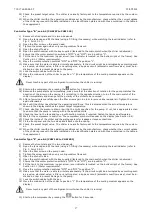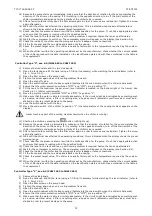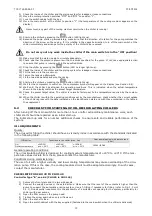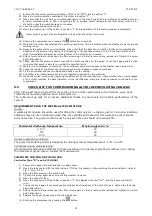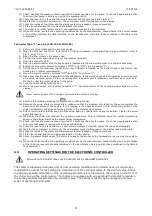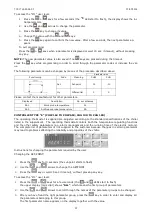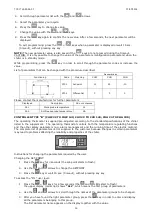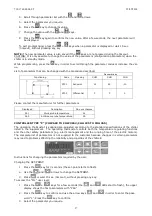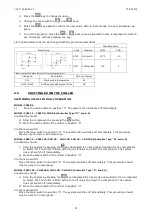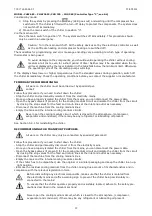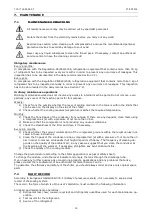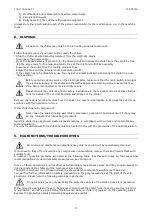
710.1760.00.04-05
22/05/2014
16
The glycol must contain anti-corrosion additives. In the standard configuration, the CHW series, ethylene
glycol in concentrations of 20% up to a maximum of 34% may be used for minus temperatures down to
–10°C. Add antifreeze for ambient temperatures of approx. ±0°C.
When antifreeze is used, it is important to make sure that the current consumption remains within the
data indicated on the identification plate on the motor.
CHECKLIST FOR CHW 09 TO CHW 3652
(CHW 09)
1)
Fill the collection tank. Open the tank cap and fill the tank (using a T-fitting if necessary) while watching the
level indicator (refer to Fig. 1, Point 5.2.1).
2)
Move the main switch of the chiller to position “1”.
3)
Top up the tank again if too much cooling medium has flowed out of the shut-off valve.
Controller Type “D”, see 6.4 (CHW 11 to CHW 36)
1)
Remove the lid panel and the two side panels.
2)
Fill the collection tank. Open the tank cap and fill the tank (using a T-fitting if necessary) while watching the
level indicator (refer to Fig. 1, Point 5.2.1).
3)
Open the filler screw on the pump head.
4)
Tighten the screw again when only cooling medium flows out.
5)
Open the shut-off valve.
6)
Move the main switch of the chiller to position “1”. The display will show “OFF” and the pump will start up.
7)
Top up the tank again if too much cooling medium has flowed out of the shut-off valve.
8)
After a few minutes carefully open the filler screw again in order to remove any residual air. Tighten the screw
again afterwards.
9)
Replace the upper lid panel and the two side panels.
10)
Start up the compressor by pressing the
button.
11)
Wait until the chiller has attained the operating conditions. This is indicated when the actual temperature
shown in the display matches the preset target temperature.
12)
When the chiller is within the operating conditions set by the manufacturer, check whether the electrical ab-
sorption of the chiller agrees with the data indicated on the identification plate and with those contained in the
table in the supplement.
Controller Type “B”, see 6.4 (CHW 29 to CHW 67)
1)
Remove the front plate and the two side panels.
2)
Fill the tank through the connection on the top of the chiller , or using a T-fitting if necessary, while watching
the level indicator (refer to Fig. 1, Point 5.2.1).
3)
Open the filler screw on the pump head.
4)
Tighten the screw again when only cooling medium flows out.
5)
Open the shut-off valve.
6)
Open the switch cabinet with the key supplied (fastened to the main switch when the chiller is delivered).
7)
Ensure that the motor protection switches (“MTC” and “MTP”) are in position “0”.
8)
Fill the tank to the maximum (upper arrow, level indicator is located on the bottom right of the frame). See
Section 6.1.1 (Water requirements).
9)
Move the motor protection switches “MTC” and “MTP” to position “1”.
10)
Make sure that the water is able to circulate adequately. It the circuit might be interrupted by something such
as a valve, electrical valve, a filter or anything else, a by-pass circuit (automatic overflow valve) must be in-
stalled in order to prevent damage to the pump.
11)
Lock the switch cabinet with the key.
12)
Move the main switch of the chiller to position “1” (the temperature of the cooling medium appears on the
display).
Never touch any part of the refrigerant circuit when the chiller is running!
13)
Start up the compressor by pressing the
button for 3 seconds.
14)
Because the pump starts up immediately, make sure that the direction of rotation for the pump matches the
direction of the arrow on the casing. If it is rotating in the opposite direction, turn off the main switch of the
chiller immediately and arrange for the polarity of the chiller to be reversed.
15)
After a few minutes carefully open the filler screw again in order to remove any residual air. Tighten the screw
again afterwards.
16)
Wait until the chiller has attained the operating conditions. This is indicated when the actual temperature
shown in the display matches the preset target temperature.
17)
Check whether the pressure shown is within the limits specified for the pump. If not, take appropriate action
to ensure that the pump is running within the specified limits.
18)
Check the level in the tank and top up with cooling medium if required.
19)
Wait for the compressor to switch on. The compressor symbol will appear on the display (see Section 6.4).
20)
Check the inside of the chiller and the piping system for leakage or loose connections.
21)
Fit the front panel and the two side panels back onto the casing.
Summary of Contents for CHG 08
Page 40: ...710 1760 00 04 05 22 05 2014 40 CHW 20 25 CHO 10 cST CHG 20 25 5 EN 60204 EN 378 2...
Page 41: ...710 1760 00 04 05 22 05 2014 41 HFC CE 842 2006 3 3 1 3 2 C CND EVA HP LP...
Page 42: ...710 1760 00 04 05 22 05 2014 42 MHP MLP PV R V a 2 5 b VE 2 5 MOP IAF 3 3 MF P...
Page 43: ...710 1760 00 04 05 22 05 2014 43 BP BPM CAA EV 1 1 VNR FL LVE RA TD VNR EV 1 2 3...
Page 44: ...710 1760 00 04 05 22 05 2014 44 1 2 3 4 5 6 7 3 4 ALR...
Page 65: ...710 1760 00 04 05 22 05 2014 65 CHW 682 CHW 3652 CHG 225 CHG 365 6 4 1 2 0 0 5 2 1...
Page 67: ...710 1760 00 04 05 22 05 2014 67 5 6 8 9 10 3 20 15...
















